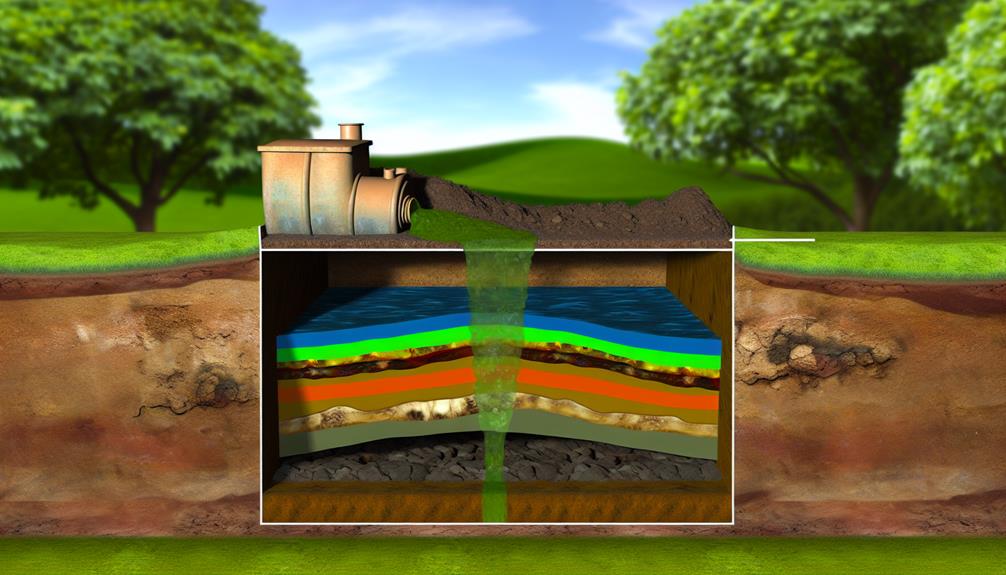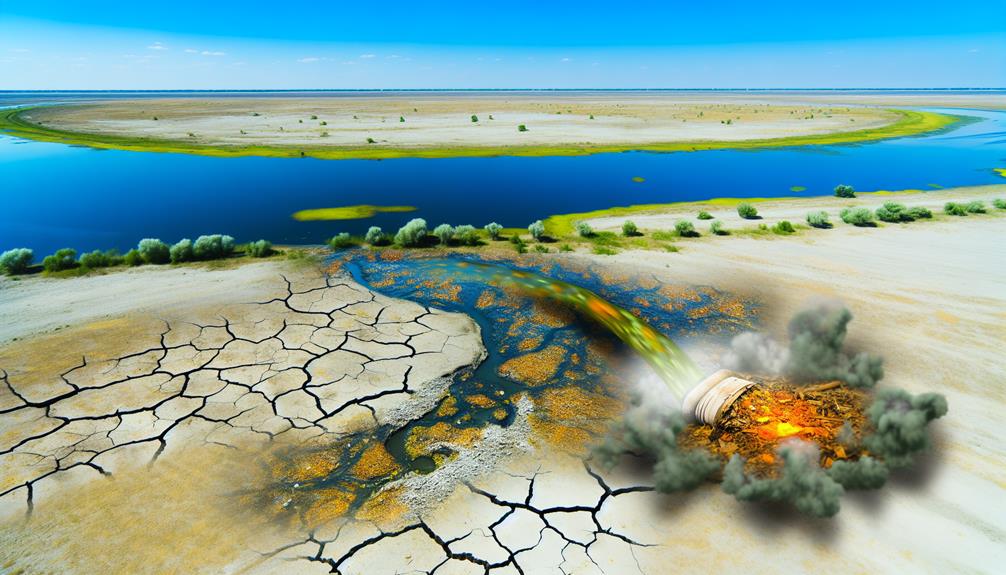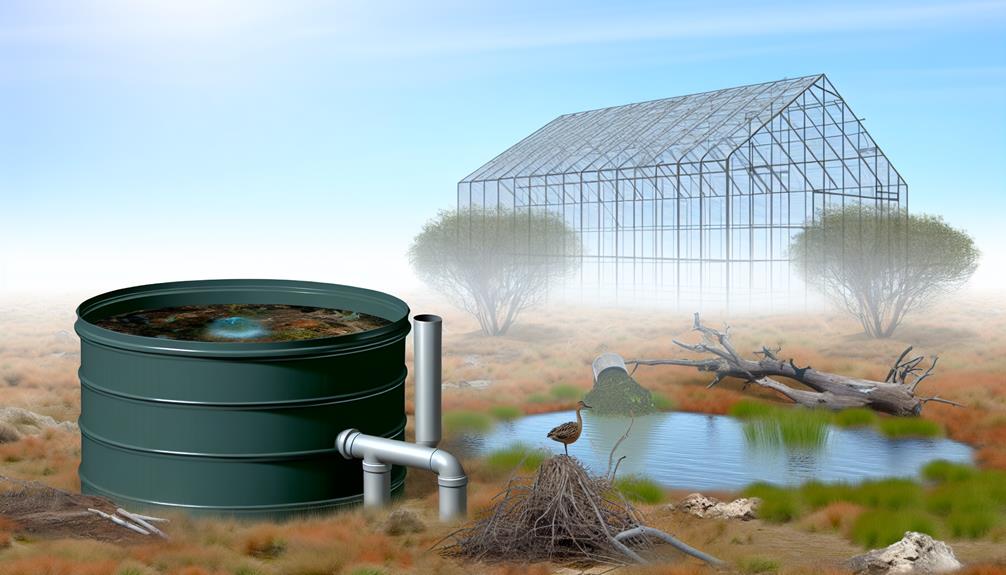Discover how to protect your septic system from breakdown with...
Read MoreYou & Your Septic Tank
Impacts of Neglecting Septic Tank Pumping on Environment
Our professional septic service team offers comprehensive septic tank pumping services to keep your system running smoothly. Get a FREE Quote Today.

Impacts of Neglecting Septic Tank Pumping on Environment
Like a sleeping giant that stirs trouble when ignored, neglecting septic tank pumping can have far-reaching consequences on our environment.
You might not realize it, but your septic tank isn’t just a simple storage unit for waste; it’s a potential source of significant environmental issues if not maintained correctly.
Imagine hazardous bacteria and harmful chemicals spilling into your backyard, contaminating the groundwater, and eventually finding their way into our rivers and lakes.
Now, if you’re wondering what happens next, we’re just getting to the heart of the matter.
Key Takeaways
- Neglecting septic tank maintenance can result in groundwater contamination, leading to health hazards such as gastrointestinal disorders and hepatitis.
- Surface water pollution risks increase when septic tanks are not regularly pumped, causing contamination of nearby rivers, lakes, and streams and resulting in waterborne diseases and bacterial infections.
- Soil degradation occurs when septic tank overflow introduces harmful pathogens and toxins into the soil, reducing fertility and affecting plant growth, which can lead to decreased crop yields and pose risks to human and animal health.
- Neglecting septic tank pumping disrupts biodiversity and ecosystems, as pollutants from septic systems introduce harmful substances into water bodies, causing species displacement, habitat disruption, and alteration of predator-prey dynamics.
Groundwater Contamination From Septic Tanks

Unchecked septic tanks can become a significant source of groundwater contamination, posing serious risks to both human health and the environment. You might underestimate the gravity of this issue, but the health hazards and potential for infrastructure damage are real and substantial.
When septic tanks aren’t regularly maintained, they can leak harmful bacteria and viruses into the groundwater. You’re then exposed to health hazards including gastrointestinal disorders, hepatitis, and other serious diseases. This contamination doesn’t just affect you but seeps into the wider community, impacting public health.
Moreover, this contamination can lead to infrastructure damage. As harmful substances infiltrate the soil, they can compromise the integrity of nearby structures, causing them to weaken or even collapse. This isn’t just a financial burden, it also poses a safety risk.
Research emphasizes the importance of regular septic tank pumping to prevent these issues. The Environmental Protection Agency recommends tanks to be pumped every three to five years, but this can vary depending on usage and size. Ignoring this crucial maintenance task can lead to devastating consequences for your health, your property, and your environment.
Surface Water Pollution Risks
Often overlooked, surface water pollution is another serious environmental risk you face when neglecting septic tank maintenance. When you don’t pump your septic tank regularly, it overflows, and this waste can end up in nearby rivers, lakes, and streams. This not only leads to health hazards but also disrupts the ecosystem.
The table below illustrates some key health hazards and waste management issues associated with surface water pollution:
| Health Hazards | Waste Management Issues |
|---|---|
| Waterborne diseases | Inefficient waste disposal |
| Skin and eye infections | Contamination of water bodies |
| Gastrointestinal illnesses | Overflow of septic tanks |
| Hepatitis | Inadequate sanitation practices |
| E.coli and other bacterial infections | Failure to pump septic tanks regularly |
Your neglect in septic tank maintenance can lead to devastating impacts. Health conditions linked to contaminated surface water can range from mild discomfort to serious illnesses. Poor waste management practices also exacerbate the issue, leading to the overflow of septic tanks and contamination of pristine water bodies. Hence, pumping your septic tank regularly is not just about maintaining your home; it’s about protecting the environment and your health.
Soil Degradation Due to Overflows

While the contamination of water bodies is a grave concern, the impact of neglected septic tank maintenance on the soil is another significant environmental issue you need to be aware of. Overflows from poorly maintained septic tanks can lead to soil degradation, a problem with serious agricultural implications.
When septic tanks aren’t regularly pumped, the overflow doesn’t just vanish. Instead, it seeps into the surrounding soil, carrying harmful pathogens and toxins. These substances degrade soil quality, reducing its fertility and ability to support plant growth. For farmers and gardeners, this degradation can lead to decreased crop yields and ruined landscapes.
Moreover, this soil degradation isn’t just an agricultural problem – it’s also a health hazard. The pathogens and toxins can potentially enter the food chain through contaminated crops, posing risks to both human and animal health. Additionally, children who play in soil contaminated by septic tank overflows can be exposed to these harmful substances, potentially leading to serious illnesses.
The neglect of septic tank maintenance, therefore, doesn’t just affect the tank owners. It has wider implications for the environment and public health. It’s a serious issue that deserves our attention and immediate action.
Impact on Biodiversity and Ecosystems
Beyond the soil, neglecting septic tank pumping also drastically disrupts biodiversity and ecosystems. Overflow, leakage, or seepage from inadequately maintained septic systems can introduce harmful pollutants into nearby water bodies. This results in severe habitat disruption, adversely affecting aquatic organisms.
- Species Displacement: The introduction of pollutants alters the chemical composition of water bodies, making them uninhabitable for certain species. They’re forced to migrate, leading to species displacement. It’s not just the aquatic life that’s affected, but also terrestrial animals that depend on these water sources.
- Habitat Disruption: The pollutants can devastate the growth of aquatic plants, key to maintaining a balanced ecosystem. They provide oxygen, food, and shelter to numerous species. Their loss can lead to an unbalanced ecosystem, impacting the survival of various species.
- Ecosystem Imbalance: The displacement of species and habitat disruption ripple through the ecosystem, disrupting food chains and altering predator-prey dynamics. This can potentially lead to the extinction of certain species.
You’re not just neglecting a mundane household task, but you’re contributing to a broader environmental crisis. It’s essential to pump your septic tank regularly to prevent the disruption of delicate ecosystems and loss of biodiversity.
Greenhouse Gas Emissions From Septic Tanks

Unbeknownst to many, neglected septic tanks are a significant source of greenhouse gas emissions, contributing to the escalating issue of climate change.
The process of organic waste breakdown in your tank, if not managed properly, leads to methane production. Methane, a potent greenhouse gas, holds 25 times more heat than carbon dioxide over a 100-year period. Regular pumping of your tank can mitigate this, but neglecting it exacerbates the problem.
Your septic tank’s carbon footprint extends beyond methane. The energy used in the pumping process and the transportation of waste adds to your tank’s emissions. Additionally, leakages from a poorly maintained tank can contaminate nearby soil and water bodies, indirectly causing further carbon releases.
Research indicates that a well-maintained septic system produces significantly less emissions. By ensuring timely pumping and maintenance, you can reduce your septic tank’s carbon footprint and contribute to climate change mitigation.
Conclusion
So, you thought neglecting your septic tank pumping was harmless? Think again.
You’re not only damaging your backyard, but wreaking havoc on our earth.
From tainting groundwater and polluting surface water, to eroding soil and disrupting ecosystems, your oversight has far-reaching impacts.
And let’s not forget those pesky greenhouse gases.
It’s ironic, isn’t it? A simple pump neglected, an entire environment affected.
So, do your part, pump that tank, and keep our world a cleaner place.
You may also like...
Why Are DIY Fixes Essential for Septic Tank Pumping?
Tap into the importance of DIY fixes for septic tank...
Read MoreUnveiling the Average Costs of Septic Tank Pumping
Master the mysteries of septic tank pumping costs and avoid...
Read More
The Best Septic Tank Pumping Services Near You

Answer Some Questions
Let us know about your needs so we can find you the right septic tank pros.

Get Quotes
We will put you in touch with the right septic tank pros for your job and location.

Hire Right
Compare quotes, message or call pros, and hire only when ready.



